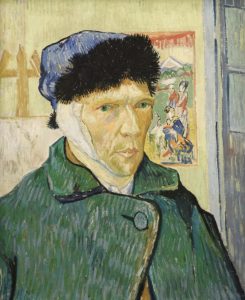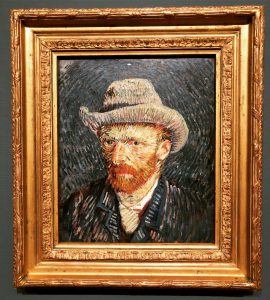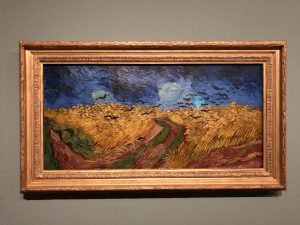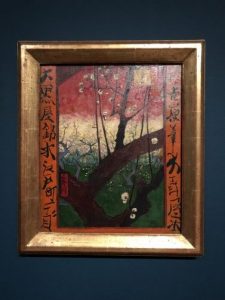Grace under torture: an interview with Van Gogh’s Left Ear
12 March 2019A discussion on art and madness with equal parts brilliance and trauma.

Self portrait with Bandaged Ear.
Vincent van Gogh has long been associated with genius, the embodiment of the ‘tortured artist’. Scientists have found an inverse link between mental health afflictions and true original thought. The more severe the issue, the greater the creative enterprise.
Widely theorized to have suffered from bi-polar disorder, in his short life Van Gogh produced thousands of works of art, and remains one of today’s most compelling painters.
Now, in a never before published autobiographical work called ‘Being cut off: Vincent’s life and mind’, Van Gogh’s Left Ear has published its telling of its owner’s story. Though the artist died over a hundred and twenty years ago, his ear lives on, close to the ground of the times in which we find ourselves.
Sweeping prose on Vincent’s time as a child in the Dutch countryside, his work in the mines, his decision to take up painting, the move to France, friendship, love and acute isolation take up most of the six hundred plus pages. Interspersed between them are poems of loss, abandonment, grief and separation. The book ends with a poignant ode to the owner who so tragically shot himself at the age of thirty-seven.
In an exclusive interview Left Ear discusses the challenges of separation, what it was like to once be part of Vincent’s body and the distinction between creativity and madness. We meet in a stark room off the Van Gogh museum in Amsterdam’s cultural district.
Left Ear’s damage is still apparent, undressed from the bandages we have come to recognize it wrapped in self portraits. The wound has healed. But the mental afflictions which made the artist slice it off in rage and desperation are still clear.
Thank you for meeting with me. The book is incredible! Was it hard for you to write?
Vincent would have wanted this version of his life to be known. He killed himself not long after getting rid of me. I survived so I decided to tell his story, it’s been percolating inside me for a while.
Why now?
His legacy endures in ways which would deeply heal him today. I can only offer a glimpse of him, of his astonishing mind, as I experienced it. Perhaps the world would like to understand that perspective.

Van Gogh’s experimenting with a mix of dots and short brush strokes was in keeping with his contemporaries. Pointillist influences included close friend Camile Pissarro.
Existing conjecture aside, why do you think he cut you off?
He wanted to be loved. He suffered rejection and feelings of inadequacy, shame… overall intolerable insecurity. Feeling any kind of physical pain was one of the ways he could process the mental anguish.
What was he like?
It was difficult to be him. Even as I remain a living vestige of him I continue to process his life – what he heard, observed, collected. Just because he severed me, doesn’t make me less of him. Parts of someone, even when dead, like former lovers, stick on, reminding the person of what they lost. What they learned.
Vincent’s fire burned him within though he tried his best to direct it outwards. He had a lot to say, it was chaotic in his head, the chaos was contained and flowed better on paper, canvas, whatever he could find to express himself. And certainly in more enigmatic ways than he did in person.
But he had friends – they liked him, admired his work.
Some did. He was an artist moving about with the begging bowl of validation, as often artists do. But, eventually, no matter the change that rattles around within, it’s never enough. In his case it was next to nothing.
So artists are greedy?
Yes and no. What I mean is, who isn’t? For admiration, love? Humans suffer from feeling they’re not enough, inadequacy is a universal language don’t you think? It was his soul in those brush strokes. He sold one painting in his lifetime. Imagine the enormous sense of failure and rejection.
The rejection seeped into many other areas too.
Yes. His father never accepted his decision to be an artist. Women he loved emphatically did not return his love. He fell out with his best friend, his enthusiasms were met with derision often. Jung would point to a pattern.

Van Gogh’s rumored last painting, Wheatfield with Crows.
Would Carl Jung say that Van Gogh was looking for love in the wrong places?
Maybe. To keep his story going – keep being rejected. It fed his melancholy. It proved to his starving soul his own worthlessness.
You mean he was seeking out rejection in his most loving relationships because it was familiar?
Yes.
Why?
It’s familiar, comfortable. It’s basic psych 101.
First, early childhood experiences. Second, there’s the constant contradiction between artistic expression and dependency on others for validation. Since many artists work in isolation – painters, sculptors, poets, writers – it makes connecting to people a two headed dragon so to speak. You need people to relate to your work. But you can’t have people around you in deep and meaningful ways since you’re married to the work. It’s cherishing the aloneness while resenting the loneliness.
And your point is…?
That which sustains you also takes away from you. The sacrifice is huge. By its very nature creativity is fed through the process of individual thought. If Vincent discussed his art with Seurat or Gauguin, it was just the exchange of the ideas themselves. The creation was done alone.
And the tug was between being alone to create the art but being with someone who nourishes the spirit to create?
Yes. Love for the art versus love for a human. This is where it’s easier to have a muse. With a muse, it’s idolatry in many ways – so the love endures, the pedestal and idealization supports the drive. It’s a professional hazard for painters, writers, musicians.
The two can co-exist – many have done it.
Hey, I’m Vincent’s ear. This is about him. He couldn’t blend the two. Maybe if he sold a couple of the oils, maybe if his father patted him on the back once in a while, maybe if he’d had his love returned…
Are you saying it’s his father’s fault? Handing Van Gogh generous approval would have ensured he was buried with you still attached to his body?
Perhaps. It’s one of the reasons. I certainly blame him in large part.
And this absolves Van Gogh of taking responsibility for his own state of mind?
Hold on now. He took himself down to the hospital at St. Remy, he recognized his dire depressive state. He knew he was unwell. He was constantly trying to unravel his inner workings. Until they unraveled him instead.
All I’m saying is – what happens to you as a young child is key to what you do with yourself, how you grow into adulthood. He was rejected by his first authority figures – the ones who are supposed to love you.
Added to that, this is the mind of a creative virtuoso trapped in the body of a mortal human with an abject desire for companionship, acceptance and love, who is now being rejected on loop.
Which you said is self fulfilling.
Exactly. Do you see how that itself is enough to cause torment? Added to it your best friend disapproves of your thought process, you’re stuck in poverty, your patron is your financially struggling brother who has his own family to take care of, you aren’t selling a single piece of your work, you can never repay him, your current milieu doesn’t understand your vision… do I need to repeat this?

Van Gogh was inspired by Japanese styles and interpreted several famous artworks. This one from the original by Utagawa Hiroshige.
What about the mental illness? That wasn’t from an outside influence.
He embodied the stereo-type of the mad artist. On one hand you have the creativity that feeds you. On the other is your inability to cope with it. It leads to all kinds of frustrations, anxiety. In Vincent’s case, depression and alcoholism. Suicide eventually.
Additionally, early life trauma correlates to the onset of certain mental health problems. Besides, a large number people with mental health issues are directly attracted to the arts. So it goes both ways. What came first – the artist or the mental health issue?
He was ahead of his time.
He wasn’t ahead of his time any more than his peers. He was just mired in bad luck, being misunderstood and his own demons. Let’s also not forget – passionate people can be scary.
So he self-harmed?
It’s been known to happen. There must be so many forlorn people with so much to offer but no one to give to. Or those they want to give to are unable to receive their gifts. It can be overwhelming.
Vincent tried all his life to understand himself. Understand the world through art. It hurt him that very few actually appreciated the beauty of his world. Finally, the only way… (long pause) the only way was to hurt himself. So he knew he mattered – to himself. To bring meaning to his life.
If you could be reunited with him now what would you say to him?
That he is loved. That his flowers are in museums all over the world. That his stars shine across scarves and tote bags and hairpins. The earth he painted – people lean into the frame so they can smell it. That there are books and songs and poems written about him and for him. That his art – his life – inspire hundreds – no thousands – of people. That he is a legend.
Being cut off: Vincent’s life and mind
By Vincent van Gogh’s Left Ear.
Out now on hardback, Taschen. 605 pages; €26.99.
ISBN 303-1853-290790
 0 comments
0 comments

